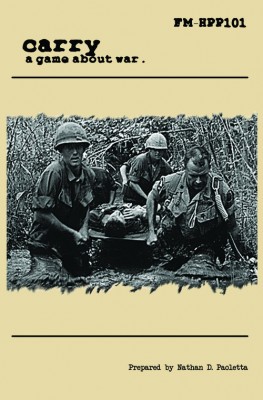I started to feel that I didn’t know roleplaying games well enough so I came up with the plan to read a roleplaying game corebook for every year they have been published. Selection criteria is whatever I find interesting.

Where does the players’ knowledge of the setting and the genre come from? Some roleplaying games, such as Star Trek Adventures, uses an established IP. The assumption is that the participants have watched enough Star Trek to know what’s what. Others, such as Shadowrun and Vampire: the Masquerade, build elaborate worlds of their own.
Some indie games go the Apocalypse World route where the idea is that the game hews so closely to the clichés of the genre (postapocalyptic in the case of Apocalypse World) that the players are assumed to know them. The players improvise new elements into the game world based on the movies, tv shows, books, comics etc. from the same genre they have seen.
Personally, I’ve always been of two minds about this design choice. On one hand, it’s great because it works: Players need something familiar to work with to fully creatively participate in a game. They don’t need to be briefed so much because they already have the knowledge needed.
On the other, I’ve found that often when people improvise according to a genre, they produce the most boring and obvious ideas. (This applies to me too when I play these games.) The game becomes an exercise in going through genre tropes.
Like Apocalypse World, Carry relies on the players’ knowledge. In this case, the setting is the Vietnam war and the game demonstrates an interesting quandary created by relying on existing player knowledge. Who is the player? What kind of background can they be assumed to have?
The book suggests that: “This game is played better relying only on your knowledge, vague as it may be, and on your experiences.” Based on the text, it’s clearly assumed that the participants are American and their connections to the war in Vietnam flow from that background. They’re not assumed to be Finnish, and they’re most certainly not assumed to be Vietnamese.
From reading the book, I can tell that although I have seen the movies referenced in it, I’d probably still struggle to play it except as a caricature of the trope exemplified in Platoon where America’s wars are first and foremost tragedies for American (white, middle-class) soldiers.
Carry is a perfectly fine game about American soldiers in Vietnam but it’s hard for me to see it except in the context of American cultural imperialism especially as it pertains to war fiction. The American machine of cultural production is perhaps the mightiest in the world. When Americans go to war, what follows is movies and tv shows about how that experience was for the soldiers on the ground. Some romanticized, some more realistic.
Usually the other sides of those wars don’t get their own internationally acclaimed movies, often because their countries have been pounded into rubble. There are no Vietnamese, Iraqi or Libyan war movies that would have the cachet of Platoon.
As a form of soft power, American war films always invite us to emphasize with the American characters, even when the film is critical of war. They show Americans as humans and their enemies, the Vietnamese and the Iraqis, as faceless cannon fodder.
In 2009 when the tv show Generation Kill came out, I wrote an article in Maailman kuvalehti where I watched the start of the show with two Iraqis, father and son. I felt that it would behoove us to at least get the perspective of the folks who’s countries get destroyed in our American war entertainments.
One thing I found striking in watching the series with them was how little it showed anything relevant to their experience even though it was ostensibly set in Iraq. In a show about Americans, American concerns dominate totally even if there’s an Iraqi or a Vietnamese person somewhere in the background.
Perhaps one day I’ll get to see a roleplaying game about Vietnam’s wars by a Vietnamese designer.